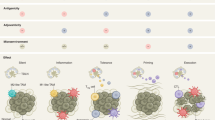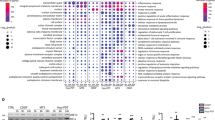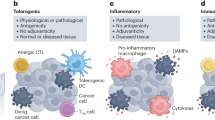Abstract
Heat shock protein expression and release is closely associated with immunogenic forms of cell death. We show that activation of the stress response within tumor cells during cell death, using an engineered form of the heat shock transcription factor, leads to an immunogenic death. Cells dying through ‘stressful death’ show decreased phagocytosis by macrophages in vitro. Moreover, cells expressing heat shock proteins during cell death are significantly more protective against subsequent tumor challenge. These data demonstrate the utility of activating cellular stress programs over the course of cytotoxic therapies to enhance immune responses to dying cells.
This is a preview of subscription content, access via your institution
Access options
Subscribe to this journal
Receive 12 print issues and online access
$259.00 per year
only $21.58 per issue
Buy this article
- Purchase on Springer Link
- Instant access to full article PDF
Prices may be subject to local taxes which are calculated during checkout



Similar content being viewed by others
References
Albert ML et al. Immature dendritic cells phagocytose apoptotic cells via alphavbeta5 and CD36, and cross-present antigens to cytotoxic T lymphocytes. J Exp Med 1998; 188: 1359–1368.
Albert ML, Sauter B, Bhardwaj N . Dendritic cells acquire antigen from apoptotic cells and induce class I-restricted CTLs. Nature 1998; 392: 86–89.
Gough MJ et al. Macrophages orchestrate the immune response to tumor cell death. Cancer Res 2001; 61: 7240–7247.
Fadok VA et al. Macrophages that have ingested apoptotic cells in vitro inhibit proinflammatory cytokine production through autocrine/paracrine mechanisms involving TGF-beta, PGE2, and PAF. J Clin Invest 1998; 101: 890–898.
Voll RE et al. Immunosuppressive effects of apoptotic cells. Nature 1997; 390: 350–351.
Rovere P et al. Delayed clearance of apoptotic lymphoma cells allows cross-presentation of intracellular antigens by mature dendritic cells. J Leukoc Biol 1999; 66: 345–349.
Ronchetti A et al. Immunogenicity of apoptotic cells in vivo: role of antigen load, antigen-presenting cells, and cytokines. Journal of Immunology 1999; 163: 130–136.
Melcher A et al. Tumor immunogenicity is determined by the mechanism of cell death via induction of heat shock protein expression. Nat Med 1998; 4: 581–587.
Todryk S et al. Heat shock protein 70 induced during tumor cell killing induces Th1 cytokines and targets immature dendritic cell precursors to enhance antigen uptake. J Immunol 1999; 163: 1398–1408.
Baler R, Dahl G, Voellmy R . Activation of human heat shock genes is accompanied by oligomerization, modification, and rapid translocation of heat shock transcription factor HSF1. 1993; 13: 2486–2496.
Zuo J, Rungger D, Voellmy R . Multiple layers of regulation of human heat shock transcription factor 1. Mol Cell Biol 1995; 15: 4319–4330.
Garrido C et al. Heat shock proteins: endogenous modulators of apoptotic cell death. Biochem Biophys Res Commun 2001; 286: 433–442.
Gallucci S, Lolkema M, Matzinger P . Natural adjuvants: endogenous activators of dendritic cells. Nat Med 1999; 5: 1249–1255.
Asea A et al. HSP70 stimulates cytokine production through a CD14-dependent pathway, demonstrating its dual role as a chaperone and cytokine. Nat Med 2000; 6: 435–442.
Vabulas RM et al. HSP70 as endogenous stimulus of the Toll/interleukin-1 receptor signal pathway. J Biol Chem 2002; 277: 15107–15112.
Suzue K et al. Heat shock fusion proteins as vehicles for antigen delivery into the major histocompatibility complex class I presentation pathway. 1997; 94: 13146–13151.
Singh-Jasuja H et al. Cross-presentation of glycoprotein 96-associated antigens on major histocompatibility complex class I molecules requires receptor-mediated endocytosis. J Exp Med 2000; 191: 1965–1974.
Castellino F et al. Receptor-mediated uptake of antigen/heat shock protein complexes results in major histocompatibility complex class I antigen presentation via two distinct processing pathways. J Exp Med 2000; 191: 1957–1964.
Binder R, Han D, Srivastava P . CD91: a receptor for heat shock protein gp96. Nat Immunol 2000; 1: 151–155.
Basu S et al. CD91 is a common receptor for heat shock proteins gp96, hsp90, hsp70, and calreticulin. Immunity 2001; 14: 303–313.
Ogden CA et al. C1q and mannose binding lectin engagement of cell surface calreticulin and CD91 initiates macropinocytosis and uptake of apoptotic cells. J Exp Med 2001; 194: 781–795.
Su HP et al. Interaction of CED-6/GULP, an adapter protein involved in engulfment of apoptotic cells with CED-1 and CD91/low density lipoprotein receptor-related protein (LRP). J Biol Chem 2002; 277: 11772–11779.
Vandivier RW et al. Role of surfactant proteins A, D, and C1q in the clearance of apoptotic cells in vivo and in vitro: calreticulin and CD91 as a common collectin receptor complex. J Immunol 2002; 169: 3978–3986.
Todryk SM, Gough MJ, Pockley AG . Facets of heat shock protein 70 show immunotherapeutic potential. Immunology 2003; 110: 1–9.
Chen W et al. Human 60-kDa heat-shock protein: a danger signal to the innate immune system. J Immunol 1999; 162: 3212–3219.
Feng H et al. Exogenous stress proteins enhance the immunogenicity of apoptotic tumor cells and stimulate antitumor immunity. Blood 2003; 101: 245–252.
Acknowledgements
This work was supported by NIH Grant R01 CA094180 and by the Mayo Foundation.
Author information
Authors and Affiliations
Rights and permissions
About this article
Cite this article
Gough, M., Melcher, A., Crittenden, M. et al. Induction of cell stress through gene transfer of an engineered heat shock transcription factor enhances tumor immunogenicity. Gene Ther 11, 1099–1104 (2004). https://doi.org/10.1038/sj.gt.3302274
Received:
Accepted:
Published:
Issue Date:
DOI: https://doi.org/10.1038/sj.gt.3302274



